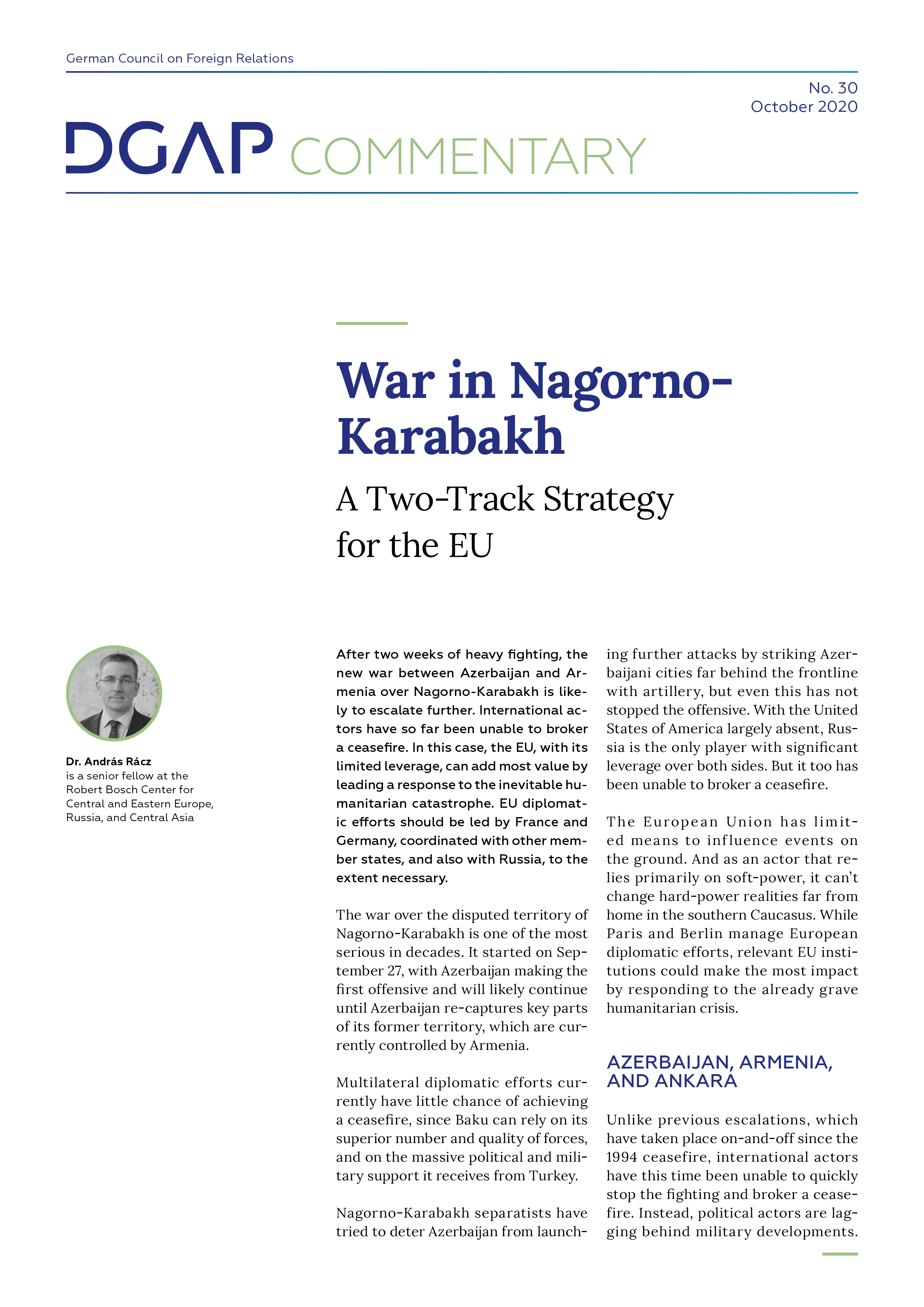The war over the disputed territory of Nagorno-Karabakh is one of the most serious in decades. It started on September 27, with Azerbaijan making the first offensive and will likely continue until Azerbaijan re-captures key parts of its former territory, which are currently controlled by Armenia.
Multilateral diplomatic efforts currently have little chance of achieving a ceasefire, since Baku can rely on its superior number and quality of forces, and on the massive political and military support it receives from Turkey.
Nagorno-Karabakh separatists have tried to deter Azerbaijan from launching further attacks by striking Azerbaijani cities far behind the frontline with artillery, but even this has not stopped the offensive. With the United States of America largely absent, Russia is the only player with significant leverage over both sides. But it too has been unable to broker a ceasefire.
The European Union has limited means to influence events on the ground. And as an actor that relies primarily on soft-power, it can’t change hard-power realities far from home in the southern Caucasus. While Paris and Berlin manage European diplomatic efforts, relevant EU institutions could make the most impact by responding to the already grave humanitarian crisis.
Azerbaijan, Armenia, and Ankara
Unlike previous escalations, which have taken place on-and-off since the 1994 ceasefire, international actors have this time been unable to quickly stop the fighting and broker a ceasefire. Instead, political actors are lagging behind military developments. Because of this, the war is likely to continue until Azerbaijan reaches a result that it is happy with.
Based on the declarations of Azerbaijan’s President Ilham Aliyev and several other leaders, the objective is to push all Armenian military forces out of the occupied territory of Azerbaijan, which includes not only Nagorno-Karabakh itself, but also the seven districts adjacent to it, which have been largely under Armenian control since 1994. While both sides are shelling civilian settlements, the recent, targeted attacks on the Armenian Gazanchetsots cathedral in Karabakh on 8 October indicate that Azerbaijan is already conducting full unrestricted warfare.
However, it may also be the case that – as in the war in 2016 – Baku seeks to recapture only some of the adjacent regions. The strategy may be for Azerbaijan to recapture particularly Fusuli and Jabrail before returning to the negotiation table, on its own terms.
The EU as a whole has limited opportunities to contribute to settlement of the conflict
Another difference compared to the previous flare-ups is the role Turkey has been playing. On the very first day of the escalation, Turkey declared its support for Azerbaijan’s ambition to restore its territorial integrity.
Ankara is providing Baku with military, logistical and intelligence assistance and has reportedly deployed over 1,000 Syrian militants to Azerbaijan. Deployment of foreign fighters in the prolonged war over Nagorno-Karabakh has never happened since 1994, and is another reason why international actors need to engage with more urgency.
Ankara’s likely objectives include extending its influence over the South-Caucasus by making Baku more dependent on Turkey than on Moscow. Besides, by playing a decisive, policy-shaping role in the Nagorno-Karabakh conflict – not to mention its roles in Syria and Libya – Ankara may be trying to prove to the U.S. and Europe that regional problems cannot be solved without its input. Baku’s demand to have Turkey included in the OSCE Minsk Group, which is the designated multilateral settlement mechanism of the Nagorno-Karabakh conflict, reflects these ambitions.
How to stabilize the situation
When it comes to the role multilateral institutions play in stabilizing the situation, the Organization for Security and Cooperation in Europe (OSCE) finds itself hamstrung by its model of consensus-based decision-making, which prevents it from acting quickly when an armed conflict erupts between its own member states.
While the idea of deploying international peacekeepers to Nagorno-Karabakh – mandated by the United Nations or by the OSCE – regularly crops up, this would require the consent of Azerbaijan, which would be difficult to obtain now, when military efforts seem to be delivering gains. The extensive landmine contamination of the territory also makes the idea of a peacekeeping mission unrealistic.
In the framework of the Collective Security Treaty Organization (CSTO) Armenia can theoretically count on the organization’s collective defense guarantee. However, in practice, this guarantee applies only to Armenia’s territory, but not to Armenian-held territories in Azerbaijan, i.e. to Nagorno-Karabakh and its adjacent districts.
What role does Russia play?
Russia is the only power in sight that has sufficiently strong leverage over both Baku and Yerevan, since the United States is preoccupied with its upcoming election. Moscow has been reluctant to get too deeply engaged in the conflict, because its diplomatic efforts are focused on Belarus and Ukraine, as well as on relations with Europe after the poisoning of Alexei Navalny. Since Russia’s direct military involvement in the Syrian war, Moscow has also valued good relations with Turkey and doesn’t want to rock the boat too much. What’s more, Azerbaijan has long been an extremely lucrative importer of Russian arms.
While Russia has plenty on its plate and diplomatic and economic incentives to disengage, it has demonstrated increasingly active diplomacy. President Vladimir Putin has spoken several times to Armenian Prime Minister Nikol Pashinyan on the phone. He called for the cessation of hostilities and condemned the deployment of militants from Syria. Moreover, on 7 October, Putin spoke with Azerbaijan’s President Ilham Aliyev for the first time since the outbreak of the conflict and asked him to refrain from shelling civilian settlements in Nagorno-Karabakh.
Russian Foreign Minister Sergei Lavrov has also discussed the situation both with Yerevan and Baku several times, and repeated Putin’s call for returning to the negotiation table. The Head of Russia’s Foreign Intelligence Service (SVR), Sergey Naryshkin stated that the influx of Islamists posed a threat also to Moscow.
The regular session of the Intergovernmental Council of the Eurasian Economic Union is taking place in Yerevan on 9 October, and Russian Prime Minister Mikhail Mishustin is also attending. Mishustin’s visit will be a good opportunity to discuss the issue more in detail, even though the conflict is not officially on the meeting agenda.
Besides engaging bilaterally, Russia has been actively working together with other governments, too. On 5 October the second joint declaration of Russia, the United States, and France was issued, calling on both sides to end the fighting. In making this declaration, Moscow has successfully demonstrated that in the post-Soviet region, Russia is still a key player and an unavoidable partner in addressing certain regional security problems.
What the EU can do
The EU as a whole has limited opportunities to contribute to settlement of the conflict. The EU, in fact, has very limited leverage over Azerbaijan, since Baku has never harbored ambitions of EU accession. It does not intend to adopt the EU’s fundamental democratic values, nor does it need financial support from the EU due to its rich oil reserves.
The EU’s leverage over Armenia is slightly stronger, but Yerevan’s foreign policy choices are dominated by its membership in the CSTO and the Eurasian Economic Union. The EU is not part of the OSCE Minsk Group either. Only France is.
Germany’s ongoing EU presidency and the upcoming German chairmanship of the Council of Europe necessitates Berlin’s involvement in addressing the conflict. At the margins of the Globsec 2020 forum in Bratislava on October 8, German Foreign Minister Heiko Maas held bilateral talks with his Turkish counterpart, Mevlüt Çavuşoğlu, about the eastern Mediterranean and the Nagorno-Karabakh conflict. It is important to note that Berlin has a more nuanced relationship with Turkey than Paris, leading to considerable differences in the assessment of the conflict. A more coordinated approach between these two key member states is a precondition for more effective EU actions.
This leads to the need for a two-track strategy. EU member states should conduct active diplomacy in a coordinated way, and not only towards Baku and Yerevan, but vis-à-vis Turkey as well. By acting on the national level, problems originating from the lack of intra-EU consensus could be bridged. It might also make Ankara likely to take bilateral diplomacy more seriously and make coordination with the U.S. and Russia easier, to the extent it is necessary.
Meanwhile, the EU as a whole might add most value by addressing the already grave humanitarian consequences of the crisis. Thousands have already left the Nagorno-Karabakh region to Armenia, and if the fighting continues, more will follow. Civilian infrastructure in the Nagorno-Karabakh region has suffered considerable damage, and supplies are already running out. The EU could offer lasting humanitarian assistance or deploy a humanitarian mission to Armenia and Azerbaijan. The necessary preparations could be started during the 12 October Foreign Affairs Council.


